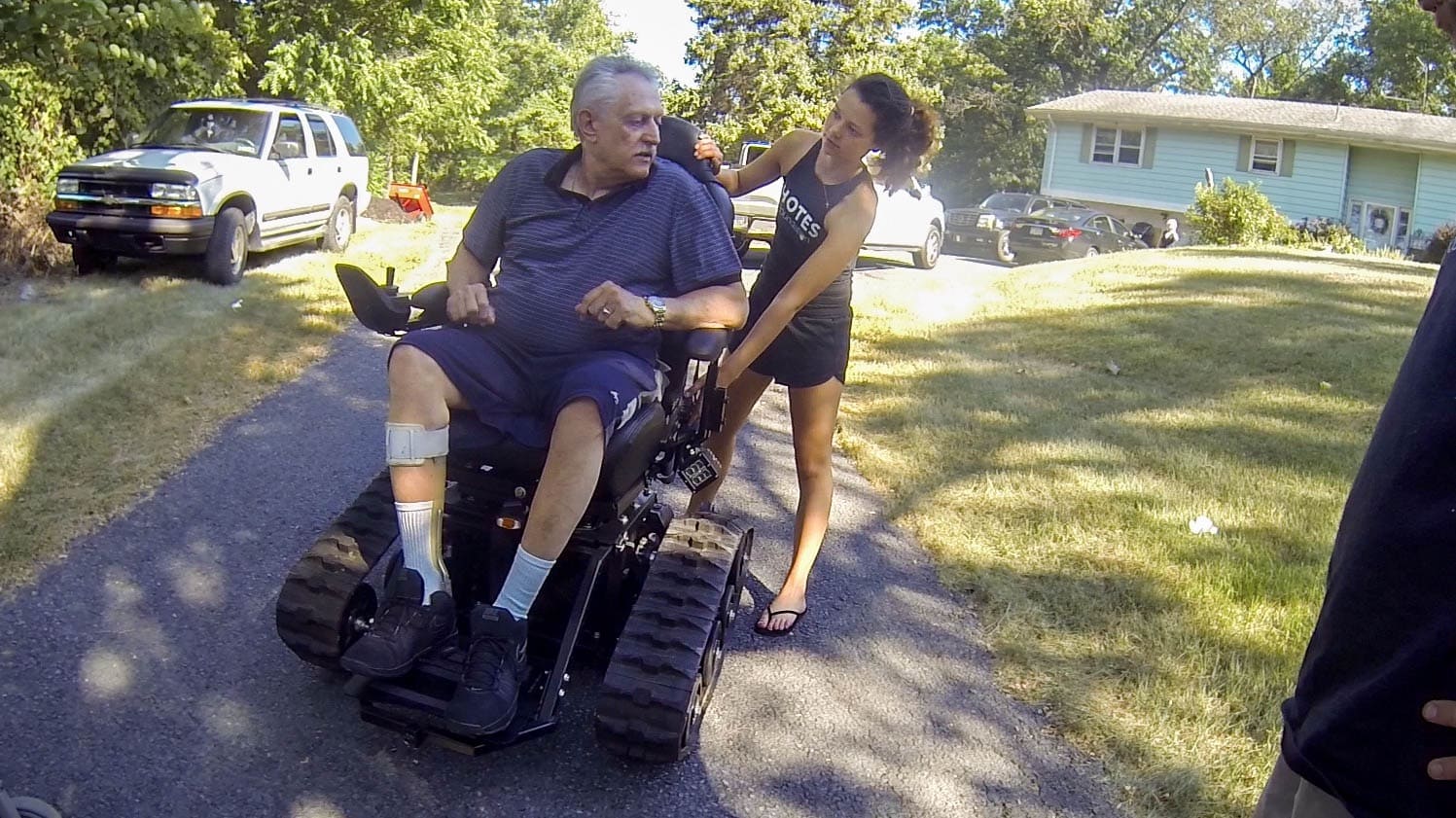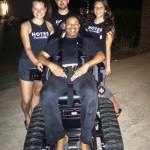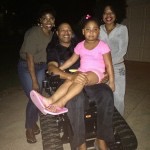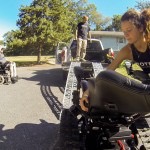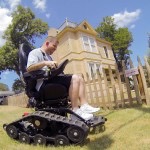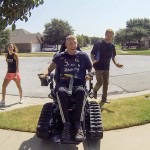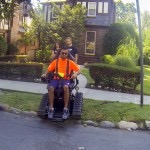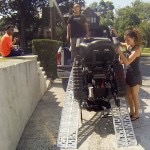Q & A with a Young Track Chair Volunteer
Alex Arciniega is a bright, cheerful, energetic 17-year-old college freshman. Her sister, Roxanne, is a boisterous, funny, 12-year-old middle school student. This past summer, both girls volunteered with the Hotes Foundation to deliver specially designed tracked wheelchairs to five wounded veterans. It was Roxanne’s second time as a track chair volunteer, and Alex’s first. Along with Michael Feeser, the Hotes Foundation volunteer who coordinated the trip, the two flew to the East Coast and together all three delivered chairs in New York, Pennsylvania, Virginia, and Texas. In two days the team drove 850 miles and racked up 9,000 through the air. Just recently, we spoke with Alex, and after catching up with her, we asked her to tell us about the trip and what it meant to her, and what getting a track chair meant to the veterans. Below are some excerpts from that conversation.
HF: Alex, before we begin, can you give our readers a little background, tell us why you wanted to volunteer for the track chair delivery trip in the first place?
Alex: It was because my sister and dad had volunteered before and they loved it. I’d heard so much about the track chairs and deliveries from them that I wanted to do it myself. Plus, I’d never been to any of those places. I really love to travel and was excited to go and see somewhere new.
HF: You delivered five chairs and met five veterans? Tell us about that.
Alex: Meeting the vets ended up being my favorite part. Just hearing their stories and meeting their families, then seeing them get in the chair and actually test it, that was great. Some of them would get all nervous going uphill and others were trying to do wheelies or jumps off the curb. It was awesome to be there and see that.
HF: Was there a specific veteran whose story moved you?
Alex: They were all moving, but one guy, his name was Wilbur, he was in a bad car accident when he got back from his deployment and he’s been paralyzed ever since. He was probably in his 70’s. He lives in Pennsylvania and his driveway is very steep and one time when picking up the mail he went off the pavement and got stuck for two hours in the hot sun and had to wait for someone to come to his rescue. He didn’t have his phone on him so he waited until a UPS guy came along. Hearing that story, and how vets like him can’t be independent that’s when I really got it, that getting a track chair is a big deal to them.
Another guy had never seen his backyard before. So we got to tour it with him and I remember thinking, ‘Oh yeah, that makes sense. I guess he couldn’t get back here.’ It was a 'yeah' moment for me actually.”
HF: How did that story affect you?
Alex: It was definitely very humbling. I mean the idea of being able to provide that sense of normalcy to these heroes who had done so much for our country was big. It definitely made me excited to get to the next person and deliver a chair. I couldn’t wait to get out of the truck and introduce myself, take the track chair out of the back and get them into it. It made me eager for every stop.
HF: Give us a rundown of what the schedule was like.
Alex: Wow, I think I got like about four hours of sleep every night. We’d go to bed at eleven and wake up at three, hop on a plane or drive all day, pick up a track chair from the terminal then deliver it to the veteran’s house. It was physical work, loading and unloading chairs. Other than that there was a lot of driving.
HF: So why put yourself through all that?
Alex: I guess it’s just a way I can have a positive impact on someone’s life, and not only were we impacting the veteran’s lives, but we were benefitting their families too. The wives told us how now they could go on walks in a park with their husbands, or now they could take a trip to the beach, or go on the playground with the kids. I felt like we were really impacting people, we were helping people, and that’s why it was important. It was great to hear that and see that and be part of it.
HF: Do you think delivering the chairs in person makes a difference?
Alex: I think it makes a big difference. It makes the vets feel like they matter. They felt important and that they were being recognized and seen. These vets struggle everyday and we gave them a chance to feel normal again. Talking to them is far more important than dropping a dollar inside of a can, that’s for sure.
HF: Did this open your eyes to anything?
Alex: Actually, I didn’t realize that one of my favorite things to do is go to the beach. The veterans who are in regular wheelchairs can’t do that without feeling like a burden because their friends either have to drag them in their wheelchair or they can’t go at all. They can’t even touch the sand or it will ruin their chair. Or they can’t go hunting because they can’t take their wheelchair into the woods. They can only use them on solid ground. I saw how they can’t really get out and do stuff and see stuff because they’re limited. I’d never realized they can’t even go fishing anymore because they can’t get from point A to point B without a lot of effort.
HF: Was it hard to hear those kind of stories and see what these vets go through?
Alex: You know, when the vets would tell me their stories, I didn’t pity them. It made me admire them more because they were making the most out of their lives. They had these smiles and these great attitudes. It was really amazing.
HF: What was it like working for the Hotes Foundation?
Alex: It’s crazy. It’s hard work, but it is amazing. I feel great because I was actually contributing to what life is all about. I was getting to help people the right way, the real way. I wasn’t being asked to donate my money. I was being asked to give my time, and I’m more than willing to give my time to a cause that’s helping people.
HF: What was your one big take-away?
Alex: My big takeaway is my problems are so insignificant. We take a lot of things for granted. Even the little things like being able to go to the beach, or being able to fish, or being able to climb a mountain, or anything like that. I mean, for me, my biggest problem right now is my psyche exam, while these vets I met are struggling getting out of bed because they literally can’t. It just makes my problems seem insignificant when you put them into perspective.
HF: Is there any last thing you’d like to share?
Alex: Just my gratitude and respect for all of the vets out there. I really do look up to them a lot. And I thank Richard of course for giving us the opportunity and giving the vets the opportunity to be more mobile again. I’m very thankful, and feel very blessed.
HF: Would you do it again?
Alex: Oh my gosh, would I?! Yes! I want to. I really do want to do it until every vet has a chair. That’s my mission. That’s the goal.
As you can see, Alex and Roxanne are special young women, and the Hotes Foundation was honored that they thought to take time out of their summer vacations to deliver track chairs with us. We also hope their story inspires other young people, and any age, to think about volunteering in their communities. As Alex exemplifies, the best way to affect change is to go yourself. To find out more about the Hotes Foundation and how you can “Change Giving to Going”, contact us here at: 1-425-889-5917

